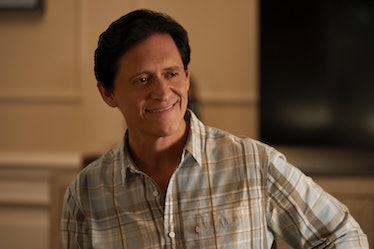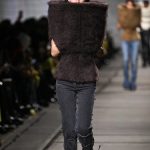At long last, the Prince of England has found his own Prince Charming. More than four years after debuting on The New York Times Best Seller List, Casey McQuiston’s beloved debut novel, Red, White & Royal Blue, has been adapted into a new feature film that premiered August 12th on Prime Video. Directed by Matthew López from a script he co-wrote with Ted Malawer, the whimsical romantic comedy chronicles the clandestine romance of Alex Claremont-Diaz (Taylor Zakhar Perez), the son of the sitting President of the United States, and Prince Henry (Nicholas Galitzine), the spare heir to the British throne, whose transatlantic rivalry belies a mutual attraction that neither is willing to admit until a cake-toppling incident at a royal event forces them to stage a fake friendship.
Although the heart of Alex and Henry’s relationship has been carried over from the novel, López elected to make a number of changes to characters and storylines that took away from the focus on the central love story. “Any time you adapt a novel for the screen, you’re going to have to make concessions because it’s two different ways of telling the story,” López says in the film’s production notes. “To me, the act of adaptation is to take the feelings that you had when reading the book and making sure that those are intact at the end of the film. When I finished reading the novel, I felt like I had been taken on this wonderful journey, with characters that I’d grown to love.”
Here are the major differences between Red, White & Royal Blue the novel and the film:
The First Family of the United States
The most glaring omission from the film is the character of June Claremont-Diaz, Alex’s wisecracking but loving sister and a member of the young “White House Trio” with Alex and Nora Holleran, the Vice President’s granddaughter. A journalism graduate from the University of Austin whose clear ties to the Democratic Party have hindered her ability to work as a political reporter, June acts as an invaluable source of support and sounding board for her younger brother in the book—and even pretends to date Henry when the media begins to speculate about the nature of his relationship with Alex. (It was also in the pages of one of her many magazines that Alex, then 12, first spotted a picture of a young Henry.) Henry’s philanthropic best friend, Percy “Pez” Okonjo, also attempts to court June in McQuiston’s novel. But with June no longer in the picture, Nora (Rachel Hilson) becomes Alex’s closest friend and the object of Pez’s (Malcolm Atobrah) affections.
Unlike the novel, in which they are divorced and co-parenting their two children, Alex’s parents, Ellen (Uma Thurman, with a thick Southern drawl) and Oscar (Clifton Collins Jr.), are still married in the adaptation. In doing so, López scrapped another character from the blended Claremont-Diaz family: Leo, Ellen’s second husband. Oscar, who splits his time between D.C. and California as a sitting U.S. senator, is now a Congressman and seems to assume the role of First Gentleman with his own political career. “It was important to me to show a Latino who is with his family, and also someone who has power in his own right and not just as the husband of the president,” Lopez explains.
Clifton Collins Jr. as Congressman and First Gentleman, Oscar Diaz
Jonathan Prime/Prime Video
The British Royal Family
On the flip side, Henry’s family also lost some key members and character arcs during the adapting process. In McQuiston’s novel, Princess Beatrice is a recovering cocaine addict—the media once dubbed her “The Powder Princess” after she struggled to cope with the untimely death of her father—and has since dedicated herself to her sobriety and charity work. The details of Bea’s secret rehab stint are also collateral damage when Alex and Henry’s private emails are made public. But in the film, Bea (Ellie Bamber), who remains her brother’s closest confidante and encourages his blossoming romance with Alex, seems to still be held in high regard in the public eye and only makes a few brief appearances.
Henry, Beatrice and their brother Philip’s mother, Princess Catherine, however, does not make an appearance in the movie. After drowning in the grief of losing her husband and becoming emotionally distant from her children, Catherine arrives in the book to defend her son in front of Queen Mary, essentially blackmailing her into letting Henry and Alex stay together. But in the film, Henry mentions that Catherine has been saving elephants in Botswana, but she is treated as an afterthought.
Instead, during that fateful meeting at Buckingham Palace with his family, Henry decides to speak for himself and makes his own case for going fully public with his relationship with Alex in the film to his hard-bitten grandfather, King James III (Stephen Fry). Given that there have been so many portrayals of a female sovereign in recent stories about the British royal family, López likely sought to gender swap the monarch in order to reflect the reality that there will be a King of England in the real world for the foreseeable future.
Ellie Bamber as Princess Bea and Nicholas Galitzine as Prince Henry
Prime Video
Alex’s Sexuality
Given that the film is told across an accelerated timeline, Perez’s Alex is already accepting and understanding of his attraction to other men, having hooked up with a guy in high school and a political journalist (more on him below!), but he struggles more with “being into Henry.” By contrast, Alex reveals in the book that he used to “mess around” with his former best friend Liam—another character sorely missing from the adaptation—and, with Nora’s help, realizes that he is bisexual. After making sense of their sexual encounters, Alex apologizes to Liam for falling out of touch and not being more considerate of his feelings.
When her son decides to come out to her and reveals the extent of his relationship with the Prince of England, Ellen clears her schedule in both the novel and film, but she only makes a PowerPoint presentation about the ethical and geopolitical implications of their relationship in the book. (She only jokes about it in the film.) In both cases, Ellen urges Henry to take care of both his heart (“You need to figure out if you feel forever about him”) and his sexual health (I bet you didn’t have Uma Thurman talking about “PrEP” and “Truvada” on your 2023 bingo card).
Perez as Alex and Uma Thurman as President Ellen Claremont
Prime Video
Alex’s Political Aspirations
Whereas the source material chronicles Alex’s final year of undergraduate studies and his decision to pursue a career in law and politics, the film finds him in the throes of law school at Georgetown University while flirting with Henry using late-night texts and phone calls. In the movie, he submits an unsolicited 14-page memo detailing how his mother can win in Texas during the next election, and her campaign sends him back to his home state to spearhead a grassroots campaign to register more voters and mobilize the younger population. (His efforts are enough to turn the state blue and help his mother win a second term.) In the book, however, Alex briefly works on Ellen’s campaign, but she is forced to kick him off the campaign after learning of his feelings for Henry.
Where’s Rafael Luna?
One of the most unfortunate casualties of the screen adaptation was Rafael Luna, an openly gay Latino senator from Colorado whom Alex helped elect and considers one of his mentors in the book. Although Alex feels betrayed when Luna goes to work for Republican senator Jeffrey Richards’ presidential campaign, Alex discovers that his family friend was really trying to gather enough evidence to prove that Richards’ campaign leaked Alex and Henry’s relationship and obtained photographs of them being intimate in a car in an attempt to ruin Ellen’s presidency. Using an anonymous email that Nora was able to decode, Luna, who later admits that he was sexually assaulted by Richards as an intern, is able to send that privileged information to expose Richards and help Ellen win re-election. While some viewers may not feel the loss of this character, there is no denying that Alex could have benefited from a friendship with an older queer man, especially when navigating his early attraction to Henry.
Who leaked the emails then?
For his adaptation, López created the character of Miguel Ramos (Juan Castano), a Politico journalist who once hooked up with Alex on the campaign trail. Although it is never confirmed explicitly, the film suggests that Ramos, the first journalist to break the story, was responsible for leaking Alex and Henry’s private emails, which coincided with the release of security camera footage of the couple’s romantic evening at the Victoria and Albert Museum. Rather than showing the immediate aftermath of the hack from Alex’s perspective, López opted to follow Henry on the morning of the leak. The scene in which Zahra Bankston (Sarah Shahi), Ellen’s deputy chief of staff, calls Shaan Srivastava (Askhay Khanna), Henry’s equerry, on their personal phones to connect the lovesick Alex and Henry remains pretty much intact—including the revelation that Zahra and Shaan have been in a romantic relationship of their own!—with the only difference being that Zahra makes the call from her office in the film and on the plane back to London in the book.
Sarah Shahi as Zahra Bankston
Prime Video
“History, huh? Bet we could make some!”
Fervent fans of book-to-screen adaptations know that the devil is always in the details, and López has made little adjustments to some of the most iconic moments in McQuiston’s novel. Instead of meeting each other at the Rio 2016 Olympics like they do in the book, Alex and Henry first met at a party at a climate conference in Melbourne, where they both didn’t make a good impression on each other.
At his family’s lake house in Texas, Alex attempts to tell Henry that he loves him while laying on a dock during the daytime rather than the night. (In the book, Oscar bought the summer house after his divorce from Ellen. But in the film, Alex says they acquired the house to escape momentarily from their very public lives.) Alex gives Henry his key necklace in exchange for his signet ring, so that they can each carry a piece of the other person no matter how far apart they are. But in the original novel, Alex places the ring on his necklace as a reminder of his connection with Henry.
During one of their long email exchanges in the book, Alex writes, “History, huh? Bet we could make some.” The iconic line—which is printed on the t-shirts of supporters after Alex and Henry are outed—first comes up in the beautiful V&A Museum scene, in which Henry tells Alex that he wants their names to be forever intertwined in the history books.



